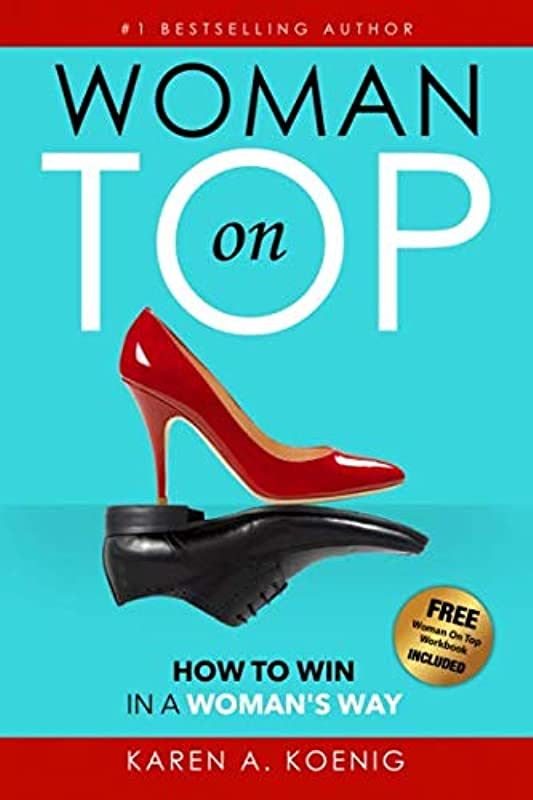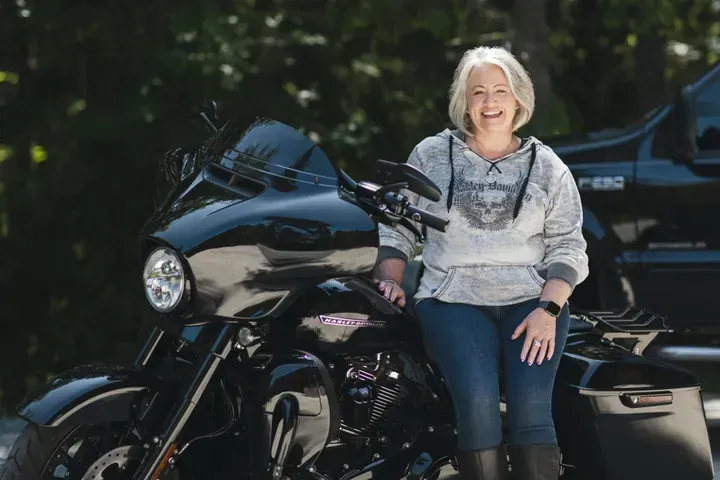Author Karen A Koenig: Five Life and Leadership Lessons I Learned In The Military
Find the truth and ask for help. When I was married, I wasn’t happy towards the end. We had gone to counseling three times over a period of three years. Things would get better for about six months; then we would go back to the same behaviors that had gotten our relationship in trouble. I was avoiding the reality that divorce was the solution, but we had two small children. Long story short, I reached out to my pastor and asked what I should do. I asked for help, and he guided me to the solution that I should not stay in an unhappy marriage just for the kids. He made me realize I was teaching my children it was okay to always be unhappy. I found the truth in my situation, and I asked for help.
Karen A. Koenig is a speaker on the topics of money types and money mindset. She is the author of “Woman on Top: How to Win in a Woman’s Way”. She is the founder of KK Financial Solutions and is a seasoned Financial Advisor/Planner who helps individuals, business owners and divorcees understand how to create a financial future that is right for them and their businesses.
Thank you so much for doing this with us! Can you tell us a bit about your childhood “backstory”?
Growing up I always wanted to be in the military. Both my parents were in the Air Force; my mother was a nurse, and my father was an EMT. I had no desire to be in the health care field, but the stories of their travels, where they got married, and were subsequently stationed, were fascinating to me.
In 1987, when I was 21, I decided to get started on my dream and went and took the ASVAB (Armed Services Vocational Aptitude Battery) test. This test measures skills and strengths, math and English, and other areas you might not have had exposure to, like mechanical comprehension and electronics information.
I excelled in all of the ASVAB areas and was allowed to pick any specialty I wanted to go into, so I chose to become an Electronic Mechanic. And, within three months headed off to Lackland AFB, Texas for Basic Training and subsequently, Aurora, Colorado for technical school.
This started my 26 year career in the Nebraska Air National Guard, which is a subset of the Air Force.
And what are you doing today? Can you share a story that exemplifies the unique work that you are doing?
After my career in the military, I’ve discovered my passion for working with people and helping them achieve their goals using my detailed project management approach. In 2016, I started KK Financial Solutions, a small boutique financial services business, with the desire to work with individuals, small businesses, and divorced people to help them plan and grow their financial future.
My favorite story of success was just recently. I started working with a client who had more month left at the end of her money. Her spending was out-of-control, and she didn’t track her money at all. After working with her for several months, she not only has a budget, but she is finding ways to stretch her money through the month and not dip into her 401k for extraneous expenses. Whenever my clients improve financially, I see it as a success not just for me and my career, but also for my clients whom I’ve grown to see as family.
Can you tell us a bit about your military background?
I graduated from technical school in November of 1987, with the rank of Airman Basic (E-1) as an electronic mechanic and started work in what was called the Sensor Shop. I spent several years working on the RF-4C aircraft and in 1993, as a Technical Sergeant (E-6), our base converted to the KC-135R and I became the NCOIC of the Maintenance Orderly Room.
I didn’t want to stay in the enlisted ranks and had always aspired to become an officer, like my mother. After I received my bachelor’s degree in 2000, I applied and became an officer with the rank of Lieutenant (0–1E).
From 2000 to 2013, I worked in several areas and rose to the rank of Major (0–4E). I had several job classifications during this time: Executive Officer, Maintenance Officer, Services Commander, Communications Commander, Operations Officer, and Director of Personnel. I retired in September of 2013.
Can you share the most interesting story that you experienced during your military career? What “take away” did you learn from that story?
The most memorable time I had was when I deployed to Diego Garcia in 2004–2005 as Services Commander. This was during Operation Iraqi Freedom (OIF), where we supported B-52 bombers flying 24-hour missions from Diego Garcia into Baghdad.
Diego Garcia is a Naval Air Station which housed the Air Force to do their missions. We lived on the South side of the island, and the Navy oversaw keeping the island supplied with incidentals, food, and bottled water during our deployments.
It came to my attention at one point that the Navy was buying pallets of bottled water for the Air Force flying missions and it was costing an exorbitant amount to buy. And then there were the plastic bottles left over, which ended up costing quite a lot to ship off the island as waste.
Because of my due diligence, the Air Force cancelled the purchases of the pallets of bottled water and instead purchased refillable water containers for the flight crews. It ended up saving the Air Force approximately $100k per year.
We are interested in fleshing out what a hero is. Did you experience or hear about a story of heroism, during your military experience? Can you share that story with us? Feel free to be as elaborate as you’d like.
Most military personnel study legendary heroes during their time in basic training and on, to understand the history of the force they are in. Two of my favorite stories on heroism was from a couple of well-known Air Force heroes. Eddie Rickenbacker and Henry “Hap” Arnold.
Eddie Rickenbacker was a race-car driver who turned self-taught pilot and he joined the military right after World War I. He racked up 26 aerial victories, a record he held until World War II. In less than a year, he was promoted to an officer’s rank and shot down his fifth enemy aircraft, earning him the title of “Ace.” Within a year, he was in command of his entire Aero Squadron. Rickenbacker Air National Guard Base home of the Ohio National Guard was named for the famous aviator and Columbus native.
Henry “Hap” Arnold oversaw the expansion of the Army Air Corps in the years between World War I and World War II to its position as the world’s largest Air Force. He oversaw the development of intercontinental bombers, radar, airlift capabilities and the use of nuclear weapons in modern air combat. He is the only person who ever held the rank of five-star general of the Army, which was later changed to general of the Air Force after it became an independent branch in 1947.
Based on that story, how would you define what a “hero” is? Can you explain?
A hero, for me, is anyone who refuses to live in an utterly passive manner. They appreciate the world that they live in, and thus would want to ensure that future generations have a future to live in. Despite the risks the job entails, a hero does his or her duty. Most heroes are not necessarily overly brave, they just react in the moment to do the right thing, whatever that may be. They are often very courageous and do the act without thinking. It’s as if it is second nature.
Does a person need to be facing a life and death situation to do something heroic or to be called a hero?
I would say not. Heroism is performed in service to others in need or in the defense of certain ideals. The risks could be to a person’s reputation vs. to their life. Simply put, the key to heroism is a concern for other people in need — a concern to defend a moral cause, knowing there is personal risk, done without the expectation of a reward.

Based on your military experience, can you share with our readers 5 Leadership or Life Lessons that you learned from your experience”? (Please share a story or example for each.)
In 2018, I was inspired to write my first book Woman On Top: How to Win in a Woman’s Way. In this book, I tackled 5 principles about leadership or life lessons. They are:
- Do First. Think Later. Learn by Doing.
- Perfection is not Progress
- Find the Truth and ask for Help
- A Target only you can Hit
- There is Power in Failure
Do First. Think Later. Learn By Doing. When I was a kid, I wanted to learn how to ride a bike. But I am stubborn and didn’t want anyone to help me. Regardless, my brother instructed me to just straddle the bike at the top of a hill, lift my feet up, and then coast down the hill…all I had to do was balance. Little did I know if I started at the top of a hill, I would be going very fast by the time I got to the bottom. And I didn’t know how to brake. By the way, I was riding a bike which had a braking system controlled by reversing the pedals…of which my feet were NOT on because I had lifted them to let the pedals spin. Half-way down the hill, I was screaming at my brother, “How do I stop?!” And low and behold, I hit a lifted piece of sidewalk and wiped out. I ended up cracking my head on the cement and getting a big goose egg, but you know what? I learned how to ride a bike! I did it first, thought about the consequences later, and then I learned how to do it better.
Perfection is not Progress. Perfection is defined as everything must be 100% accurate or in place. Perfection paralysis is when everything must be 100% to move forward, where progress is going from 50 to 60%. I worked with a gal who thought in order to move into a new job, she had to be 100% proficient at the job to even apply. Who is 100% proficient when you first start? I encouraged her to apply because she was 50 to 60% proficient, and I told her she could learn the rest on the job. If you are improving that is progress. The primary focus is starting somewhere and improving on where you are. Because when people think they need to be perfect, they often don’t get started at all.
Find the truth and ask for help. When I was married, I wasn’t happy towards the end. We had gone to counseling three times over a period of three years. Things would get better for about six months; then we would go back to the same behaviors that had gotten our relationship in trouble. I was avoiding the reality that divorce was the solution, but we had two small children. Long story short, I reached out to my pastor and asked what I should do. I asked for help, and he guided me to the solution that I should not stay in an unhappy marriage just for the kids. He made me realize I was teaching my children it was okay to always be unhappy. I found the truth in my situation, and I asked for help.
A Target only you can hit. My parents taught me at a young age to set goals. They were the ‘set it and you will achieve it’ type people. My father was an EMT in the Air Force and then went to school, after I was born, to be an engineer. My mother went to college to be a nurse, through the ROTC program, and then served four years in the Air Force to pay back her college tuition. My goals were to be the first sibling in my family to go to college, to join the Air Force and eventually get commissioned as an officer. I defined my goals by looking at what I wanted to do in life, then I looked at my family and how those goals might affect them, and then I set out to achieve them. I wrote the goal down, I mapped out the preliminary steps and then I envisioned the goal daily, keeping only the end in mind without getting caught up in the “how’s.” I now do a 5-year vision board to help my process of goal setting.
There is Power in Failure. In the process of writing my book, “Woman on Top: How to Win in a Woman’s Way” I met a huge stumbling block along the way. The publisher and I talked through the steps, and I followed his successful process for publication. I was going along great, figuring out my content; coming up with examples and fleshing out what I wanted to say, and just when I was close to finishing, I got stopped by compliance. I had received permission to write my book but was never told I had to produce the manuscript before I started to promote it. I paid for a URL and had a website set up but was never told the website had to be approved. Therefore, I had to shut it down right when I was getting started. I let this one event define how and when I was to move forward. The publisher I was using had a proven process, and I was not able to follow it, so I thought I had to quit everything, including writing the book! Even though I had a failure in the process, I was able to meet with my publisher and get back on track using a modified process to fit my needs, and still get my book done.

Do you think your experience in the military helped prepare you for business? Can you explain?
I believe there were three crucial things which helped me prepare for business, they were the core values I learned in the military. Integrity first, service before self and excellence in all we do. Integrity is the willingness to do what is right even when no one is watching. It’s the moral compass or the inner voice. Service before self is the new assignment or new job which we take that isn’t in the ideal location, or the need to retrain to do something else even if you are happy with where you are at. Excellence in all we do is a mindset of giving your best, striving to continually improve yourself, and expecting the same from others. These three important values are what I still follow for KK Financial Solutions. As a service-oriented business, I make sure to keep my integrity, honesty, and excellence in serving my clients. I strive to always think “what’s best for them” and not for me.
As you know, some people are scarred for life by their experience in the military. Did you struggle after your deployment was over? What have you done to adjust and thrive in civilian life that others may want to emulate?
I was not scarred by my deployment but there definitely was a struggle when I got back. Life goes on for those you leave behind and they learn to get along without you. It is hard to re-integrate into the family unit as sometimes the other person welcomes you back on the outside, but underneath they resent you were gone in the first place.
I adjusted by taking one day at a time and through praise. Praising my spouse and children for the things they had to do and endure while I was gone, helped in the reintegration process for me.
Are you working on any exciting new projects now? How do you think that will help people?
I am working on expanding the book I wrote in 2018, “Woman On Top: How to Win in a Woman’s Way.” Having been in male dominated fields for over 30 years, I figured out quickly that you can’t command people but learned you can only advise and guide. All those experiences, military, aerospace, and financial services had shaped me to write a book so women could know they don’t have to take a step back but a step forward into their success. I think telling stories is the best way to help people. I want to expand my book to teach people, specifically women, how to navigate through and be successful in male dominated industries while retaining femininity and grace.
What advice would you give to other leaders to help their team to thrive?
Teams thrive when they know where they fit into the big picture. In the past, I have had teams that worked for me where there seemed to be a lot of absences and complaints about the jobs they were doing. Once I sat down my team and showed them where they fit in, and where they were in relation to the bottom dollar, absences and complaints went down and we had a much happier team.
What advice would you give to other leaders about the best way to manage a large team?
First and foremost, you need to lead by example. I didn’t ever want to send an airman on a deployment without having experienced a deployment myself — you cannot help others if you haven’t walked in their shoes. Another way is direct communication. I am always straight and to the point and I expect others to be the same. And, if there are issues, praise in public and criticize in private. Last, take advice from everyone and then base your decision using what is best for the most people.
None of us are able to achieve success without some help along the way. Is there a particular person who you are grateful towards who helped get you to where you are? Can you share a story about that?
There are many people who have helped me be successful, but if I could pinpoint one person it would be the female officer, Mary, I met when I was a young lieutenant. She taught me how to present myself in the best possible way, and to have integrity in everything I do. When I have a problem or an issue I need to work through, I find myself asking WWMD, “What would Mary do?”
How have you used your success to bring goodness to the world?
I always believe in giving back and teaching what I have learned. My success came from those that helped me along the way, whether by mentoring me, teaching me in a classroom, or helping me financially. I believe in doing the same and mentoring and teaching as much as I can to help others succeed more quickly than I did. I also want others to know what I know and not to make the same mistakes I did.
You are a person of great influence. If you could inspire a movement that would bring the most amount of good to the most amount of people, what would that be? You never know what your idea can trigger. :-)
I would inspire a movement to change what is currently being taught in the school systems. I believe it would be more beneficial to teach young people practical skills on how to be successful in life. For example, how to open a bank account, how to file their taxes, how to buy a house, how to apply for a job, when/how to invest, how to interview for a job, how to write a resume, etc. These are just some of the topics I believe aren’t taught enough inside the four walls of a classroom but crucial in the real world.
Can you please give us your favorite “Life Lesson Quote”? Can you share how that was relevant to you in your life?
Get all you can, save all you can and give all you can.
- John Wesley
This is the core message of Wesley’s sermon. John Wesley is the founder of the Methodist church. His words are passionate, radical, simple, and practical. I strive so live by this quote in my everyday life as it reminds me to show up and give my 100%.
Some of the biggest names in Business, VC funding, Sports, and Entertainment read this column. Is there a person in the world, or in the US with whom you would love to have a private breakfast or lunch with, and why? He or she might just see this if we tag them :-)
I would love to sit and chat with Jamie Kern Lima, author of “Believe It” and founder of IT cosmetics. I admire her tenacity, her grit, and her authenticity. She was met with many failures in her rise to the top yet look at where she is at now…what a blessing and a gift to see her success in a highly competitive industry.
Thank you so much for these amazing insights. This was truly uplifting.
--------------------------------------------------------------
You can also view the article here.











